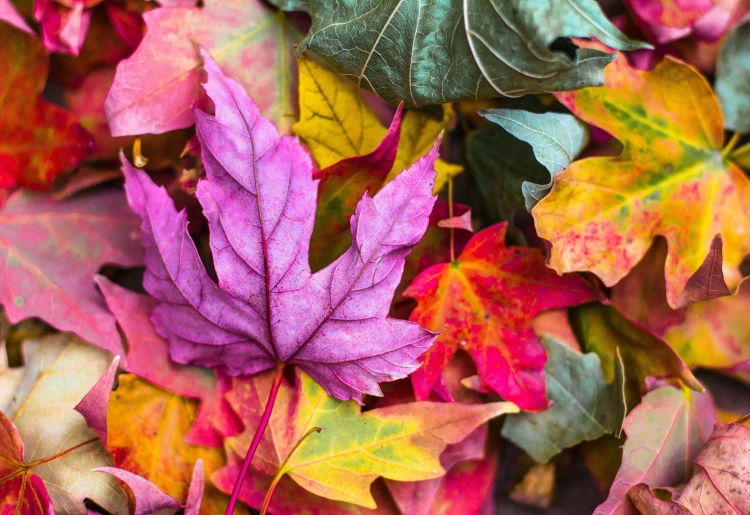How does the weather in Autumn affect your eyes?
02 September 2021

Bring on the brown leaves and fluffy jumpers!
The nights are getting longer, the days are getting colder, and we’re bringing out the jumpers from the back of our wardrobes… Autumn is almost here! It’s time to get a lot cosier as the seasons start to change, and soon we’ll be bundled up indoors with a warm mug of hot chocolate in our hands. However, the changing weather can have a negative impact on our eyes. Read on to discover some tips and tricks you can follow to prevent any possible eye irritation this autumn.
How does autumn weather cause eye irritation?
One of the ways in which the colder weather of autumn can affect your eyes is by causing dry eyes. As the temperature decreases outside, we tend to turn up the central heating to stay warm, and central heating is known to dry out the air indoors and our eyes too. This can result in irritated eyes that might feel sore, gritty, and can even appear to be red.
If you suffer from Dry Eye Syndrome, there are a few alterations you can make to your lifestyle over the coming months to prevent dry eye as much as possible this autumn. Make sure you’re consuming a diet rich in omega-3, as this can encourage more tear production, ensuring your eyes stay lubricated and decreasing your chances of experiencing dry eye. You should also make sure you’re staying hydrated this autumn, as this keeps your eyes hydrated too. Not only will your eyes thank you for it, the rest of your body will too! If your dry eyes are becoming too bothersome, you can also use eye drops to help alleviate any eye irritation.
Furthermore, while spring and summer are usually known as the ‘allergy seasons’, autumn can also trigger allergies that may irritate your eyes. In autumn, naturally, we tend to keep our windows and doors closed to keep out the cold air. However, this reduces the airflow in our homes, and the lack of airflow causes a build-up of dust mites and animal fur (if you have any furry friends!). This can then lead to an allergic reaction, causing inflamed, itchy eyes.
To prevent any allergic reactions as we spend more time indoors, try to ventilate your home and keep your windows open for at least half an hour, particularly in your bedrooms. This will let fresh air circulate through the room and disperse any allergens that may be present. If you feel the weather is too cold to do this, however, you could always purchase antihistamines to relieve your symptoms.
Tips to keep your eyes healthy this autumn:
Here are a few more tips you can follow to look after your eyes and eye health properly in autumn. Some of these include:
- Avoid coloured contact lenses: Halloween will be soon approaching next month, and many people like to spice up their costumes by wearing coloured contact lenses. However, there’s nothing more frightening than experiencing vision loss and other eye problems from improper contact lens use! Coloured contact lenses often prevent oxygen from reaching the eye, and they also increase the risk of scratching your cornea or getting germs trapped between your eye and the lens. If you’d like to find out more about the dangers of wearing coloured contact lenses, check out our blog here.
- Protect your eyes from UV rays: This tip may seem strange at first, seeing as autumn is not as sunny as spring or summer. However, as the days get shorter in autumn and the sun sets much earlier, the sun is more likely to hit our eyes during the day as it sets, and its UV rays are not any less damaging to our eyes just because it’s autumn! It would be a good idea to keep protecting your eyes from UV rays (even in the low autumn sun) by wearing sunglasses, reducing your chances of developing eye diseases such as cataracts and macular degeneration. If you’re curious about how to protect your eyes from the sun, take a look at our blog.
- Eat more autumn foods that are good for eye health: Autumn is a season that coincides with harvest time, and many autumn foods are packed full of vitamins that are good for our eyes. Orange fruits and vegetables such as carrots, oranges and sweet potatoes are excellent sources of vitamin A and C – as well as turnips, cauliflower, pomegranates and apples. Consuming more of these foods and other healthy autumnal treats will help prevent your risk of eye diseases, including cataracts and glaucoma.
By following our helpful tips and tricks above, you can be sure that your eyes will remain healthy, protected and irritant-free as we move into autumn this year. If you take good care of your eye health by preventing irritation through eye drops and ventilation, and through cooking autumn treats with some of the foods we mentioned, you’ll have more time to enjoy autumnal activities instead of worrying about your eyes. We’ll be pumpkin picking in no time!
Back to Blog
